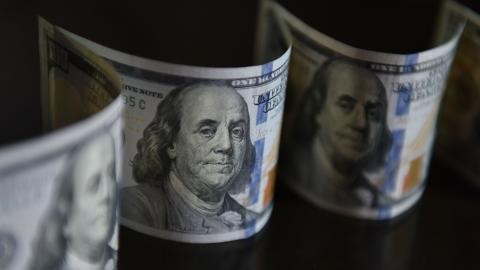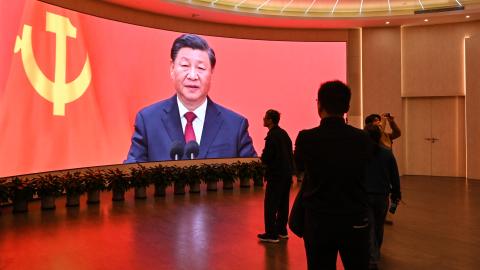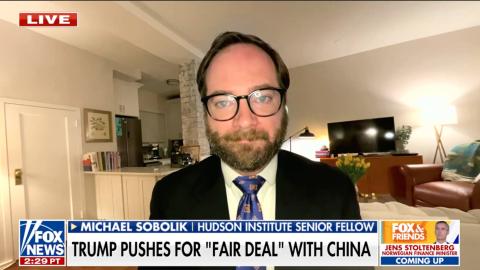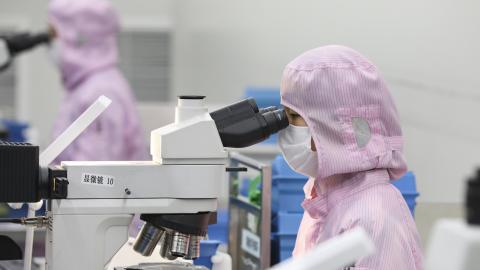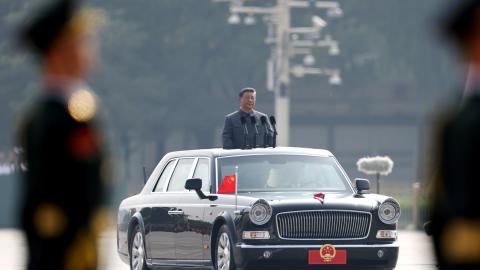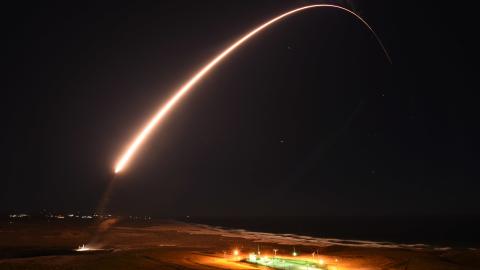
CCP Committee Chairman John Moolenaar on the State of US-China Relations
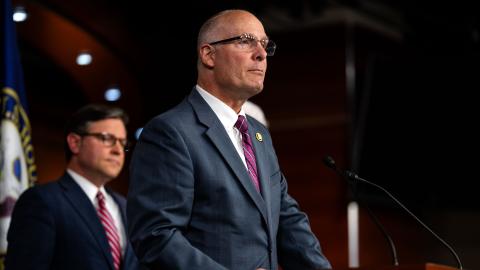
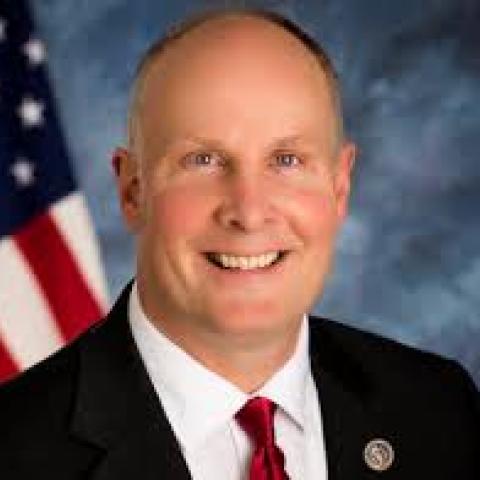
United States Representative, Second District of Michigan and Chairman, House Select Committee on the CCP

The China threat has become increasingly acute during President Donald Trump’s second term. While the White House and Congress navigate economic, security, and political relations with Beijing, the Chinese Communist Party (CCP) continues to undermine the security and sovereignty of the United States and other nations. By funding Russia’s war in Ukraine, bolstering Iran’s military capabilities, and deepening engagement with North Korea, the CCP seeks to increase its global influence and weaken the US and its allies.
Congressman John Moolenaar (R-MI), chairman of the House Select Committee on the CCP, will join Hudson Senior Fellow David Feith to discuss how Washington should approach the US-China relationship in an era of rising geopolitical competition.
Event Transcript
This transcription is automatically generated and edited lightly for accuracy. Please excuse any errors.
Joel Scanlon:
Good morning everyone, and welcome to Hudson Institute. Thanks for joining us for this very timely discussion on the US-China relationship. My name is Joel Scanlon. I’m executive vice president here at Hudson, and we are honored to have with us Congressman John Moolenaar, chairman of the House Select Committee on Strategic Competition between the United States and Chinese Communist Party. Under Chairman Moolenaar’s leadership, the select committee continues to play a vital role investigating, raising public awareness about and emphasizing the urgency of the multifaceted threats posed by the CCP to our economic and national security and that of our partners and allies.
From the infiltration of American universities, leading scientific and technological research to exploiting vulnerabilities and critical infrastructure to theft of intellectual property and subversion of export controls to the competition for leadership in AI to China’s military buildup and increasingly belligerent behavior toward Taiwan that risks a new world war. More than that, through the committee’s work, the chairman is leading a bipartisan effort to develop policy solutions that often require delicate balance, in-depth understanding of the potential costs and trade-offs and coordination with allies and perhaps above any of those accomplishments is his strategic clarity. After his remarks this morning, the chairman will be in conversation with my colleague Senior Fellow David Feith. We’re deeply grateful to you, Mr. Chairman, and the entire select committee for your steadfast leadership on the most important national security challenge of our time. Thank you. Welcome to Hudson.
John Moolenaar:
Thank you very much, Joel, and good morning everyone. And I want to thank the Hudson Institute for bringing together such a distinguished group of thinkers and leaders. That’s you. You know, Hudson has always, and for a long time, been a home for serious ideas and for courage. And I want to start today by recognizing a painful reminder of why our work together matters. Last week, Pastor Jin Mingri, the founder of the Zion Church, one of China’s largest underground congregations, was detained by Chinese authorities at his home in Beihai. His son-in-law, Bill Drexel, works here at Hudson and many of you know Bill. And I had a chance to meet with Bill’s wife recently to hear firsthand about their family’s experience, and that connection really brings this issue closer to home. It reminds us that the Chinese Communist Party’s aggression is not an abstract thing. It affects real people, people of faith, of conscience, of courage.
And let me say clearly, America has and always will stand with those who are persecuted for their beliefs, and we will allow the CCP to silence the voices of faith and freedom, not in Beijing, not in Hong Kong, and not anywhere the Party’s reach extends. The United States and the Chinese Communist Party are locked in a contest that will shape the century ahead, not simply for markets or for influence but for the rules and values that govern the modern world. The CCP has made the expanse of its ambitions unmistakably clear. Xi Jinping’s government has fused economic, technological and military power into a single system of control, one that uses innovation to crush individuals and entrench the party’s authority. They’re building a surveillance state as they export repression abroad while consolidating control at home, and they are doing so with the help of Western technology, semiconductors, software, and tools originally designed for progress that are now being used and turn towards repression.
That’s the challenge we face, ensuring that America’s openness, ingenuity, and free enterprise are never again weaponized to strengthen an authoritarian rival. We cannot afford complacency or nostalgia. Engagement has not moderated the CCP. It has emboldened it. And while economic ties have grown, so too has Beijing’s willingness to threaten our allies, steal our technology and undermine international norms. We must build a new framework that preserves and expands US technological leadership while ensuring that those same technologies cannot be turned against us. AI chips and in particular who should be able to buy them has been a hot topic in Washington, DC, lately. The primary point of contention has focused on what US companies should be allowed to sell to China. These have focused on US chip capability as the bar for determining the right threshold. Some have suggested 50 percent less than the best US chip is the right line, a US minus strategy, if you will.
I believe this is backwards. If we’re to implement a system that both keeps China locked on US technology and protects national security, we must limit the uplift we give China’s AI sector as much as possible. The American innovation system has created companies that are generations ahead of their Chinese counterparts in AI hardware. We cannot hand our strategic adversary a shortcut in developing better AI models to extend their repressive reach. Instead of using US chip capability as the bar, we must set it off China’s capability at scale to determine allowable sales, a China plus strategy. Our companies can sell to Chinese customers but limited in capability to slightly above China’s indigenous ability. Additionally, the key to AI advancement is aggregate compute and China could continue to challenge the US in AI even with less capable chips if there’s no limit to how many they can buy.
Therefore, we must limit the total computing power the Chinese market is able to accumulate to 10 percent of the US to make sure that we maintain and expand our lead in AI. This rolling technical threshold, or RTT, that we’ve proposed would implement this strategy. Instead of static rules tied to one model or benchmark, the RTT would set a dynamic line, always a step ahead of what China can produce domestically. It would ensure that our technology stays out of the hands of the People’s Liberation Army while preserving US companies market advantage and enabling them to generate revenue to invest in research and development. To put it simply, China’s capabilities should never be allowed to catch up to ours, and the RTT keeps them perpetually dependent on US technology, on our design, our software and our manufacturing know-how.
I want to make it clear though, this is not about punishing Chinese people, the people of China. We love the people of China, but it’s defending our own security. It’s about protecting the tools of freedom and preventing them from being tools of repression. But export controls alone are not enough. To sustain this advantage, we must strengthen every link in our own system. That means accelerating domestic semiconductor manufacturing, investing in critical minerals and supply chains, and aligning policy with allies from the Netherlands and Japan to South Korea and Taiwan so that the CCP cannot exploit gaps that exist between us. We must also enforce our laws with resolve. The CCP’s state-backed firms continue to target American innovation through joint ventures and shell companies. That’s why the Select Committee is working with colleagues in both parties to update our investment screening tools, closed loopholes and modernize enforcement capacity across commerce, treasury, and defense. The CCP plays the long game, but history shows that when free nations act with purpose, we outlast every tyrannical regime.
Our strategy must be comprehensive, strong enough to deter, smart enough to endure and principled enough to win. When China detains pastors like Jin Mingri for worshiping, when it imprisons Uyghur Muslims for praying, when it disappears journalists or silences business leaders, it shows the world exactly what kind of a system it represents.
Our task is to make sure that the twenty-first century is not defined by that model, that the tools of our artificial intelligence, biotechnology, and advanced manufacturing are governed by free societies that value human dignity. The rolling technical threshold and the broader strategy it represents are part of that fight. They ensure that America’s leadership and technology strengthens the free world rather than eroding it. The CCP believes America is too divided, too distracted, too dependent to lead. They believe we no longer have unity or the will to defend what we stand for, but I believe the opposite. Across party lines and across generations, America’s understand that the defense of freedom begins with clarity, clarity about what we value and what we’re willing to protect. As long as we stay focused, disciplined, and united, the CCP will remain dependent, not dominant. America will remain the indispensable leader of the free world. I want to thank you very much for being with you today.
David Feith:
Well, thank you, Chairman, and thanks to everyone for joining us today. It’s a great privilege for me to be here with you, Chairman Moolenaar and great to be at Hudson. Hudson has led on many of these issues for a long time. Hudson is now the think tank home to your predecessor as chairman of the China Select Committee, Mike Gallagher, who explains that today he’s but a software salesman at Palantir, but he and you and your colleagues really on a bipartisan basis have been invaluable for leading us. Why don’t we start the discussion with a sense of where the competition with the CCP is overall in your view? In a lot of senses we can date sort of the awakening of American thinking back about ten years. Some of the late Obama administration, certainly the election of President Trump. Mike Pence spoke from this stage as Vice President in 2018 about strategic competition with China. Where do you think we are after ten years? How do you measure success? Do you have any particular metrics, whether it’s defense spending or technology or otherwise that you would suggest we look to?
John Moolenaar:
Well, that’s a great question. Because it’s a pretty opaque situation with what China’s doing and where they are on some of these technologies and military capabilities, even the economic data that we get out of China is very suspect. It’s difficult to state with accuracy, but what we do know is 30 years ago, we had the idea that China, as it became wealthier, it become more freedom loving, more democratic, more part of the world of nations that respected rule of law. And what we’ve seen is just the opposite. Under Xi Jinping, they become more repressive both at home, abroad. They’ve through their Belt and Road Initiative. They’ve created a debt trap diplomacy that we see that in Africa, we see it in the Americas. And so they’ve become much more aggressive in the South China Sea, threatening Taiwan, being ready to take Taiwan by force if necessary.
And so we’ve seen them increasingly grow more aggressive. We’ve known for years that they’ve been investing in more engineers, basically more STEM fields. And I can remember 20 years ago hearing about the number of engineers that were produced by universities in China. And of course we had universities collaborating very closely on research, even funded by our Department of Defense, Department of Energy. Now what we’ve also learned though is that their dual-use technologies, their military civil fusion, their national security laws have changed just in the last several years where basically any Chinese national, wherever they are in the world, is under the threat of if they don’t comply with whatever the CCP requires them to do, they are violating national security laws.
And so you see this growing repression. And I would just say in the last week with the critical minerals and their willingness to shut off basically access to technology areas that we are dependent on in our military and our manufacturing, their true intent is really coming to the surface. And I would say in America whereas when the Soviet Union launched Sputnik, there was a Sputnik moment and suddenly it was all hands on deck in the United States. I believe in the last week we saw a threat economically, militarily, and basically showing the world what they’re willing to do in order to advance their own interests. So I would say it’s a huge wake-up call, and I’m excited to be part of this Committee that’s working in a bipartisan way to try and address this threat.
David Feith:
Why don’t we start right there with really rather shocking rare earths and critical minerals export control threat that Beijing has now put forward. We know that it generated a quick and notable response from President Trump and from his team. You’ve called for urgent action in statements. What specific action would you want to see from the US, from our allies on the rare earth’s issue in particular, and perhaps on other issues that are, as you say, are implied by their willingness to threaten a strangling move of this degree?
John Moolenaar:
Well, I think we need to view this not simply as a one-week strategy from China. I think we have to recognize they’re going to continue to run this play over and over again. And so I’ve been advocating and have some bipartisan legislation that looks at the PNTR status, their permanent normal trade relations status. I think that should be revoked. I think we should not view them as a normal trading relationship.
I also think when it comes to tariffs, if they’re selling different products that don’t have high value technologically or sensitive technologies, obviously there needs to be some kind of concern in terms of trade dependency, but really where we need to be focusing on critical minerals, AI, advanced technologies, hypersonic missiles, things that they have leverage in our supply chains, and I think we ought to be having a tariff up to 100 percent on those strategic. And I tend to be a free trader. That has been my philosophy all along, but you have free trade with free nations, and when they are exhibiting the kind of subsidies, the kind of strategy that isn’t simply to trade technologies and be part of a system, it’s really to drive us out of business in different industries. And we’ve seen them run that play over and over again and using subsidies, unfair trade practices, and we have to recognize that we need to have a corresponding treatment of them.
And so I think the assumptions that we made years ago need to be reevaluated and we need to send a strong message, and right now is the time to do it because they’re going to continue to run this play over and over again.
David Feith:
Part of the drama, the surprise of Beijing’s move last week is that I think as you might’ve put it in a public statement, it comes effectively as a slap in the face to President Trump before this expected summit between President Trump and Xi Jinping in the coming weeks. What do you expect out of that summit? What would you like to see out of that summit?
John Moolenaar:
Well, President Trump’s a good negotiator, so I don’t want to give him advice on negotiations, but I will say that I found it interesting the terminology that CCP used is when we’re engaged in certain behaviors, we shouldn’t be requesting dialogue. Basically they were saying, “Okay, we started this and they’re just simply corresponding and now we want to talk.” I think President Trump has good instincts. He’s trying to build a relationship with Xi Jinping. He’s trying to find ways. The difference between now and the Cold War that President Bush faced, it is a . . . Our economies weren’t intertwined.
Our economies now are intertwined, so it’s a different situation, but I do think that peace through strength policy is the right policy and we need to be very clear that it shouldn’t be to get a short-term, oh, they’re willing to sell magnets and access to technologies again because they’ll shut that off again whenever it suits their interests. And so I think we need to really reset the entire relationship, and I believe President Trump is capable of doing that. He’s got to always be viewed as someone who’s willing to talk. But I think the idea that he may go to China, I guess right now, I would say I think it’s fine that he meets Xi Jinping on the sidelines of the gathering, but I would play out some of these policies that we can enact that really address the concern and then have Beijing wanting to talk with him.
David Feith:
Are there specific things you would like to not see out of a summit? You’ve been vocal, for example, on some issues that some have reported might come out of a possible summit, a possible deal between President Trump and Xi Jinping, things like the possible US licensing of the sale of slightly modified black, well advanced AI chips to China, or possibly a willingness on the part of the US administration to welcome investment in the United States from China in things like automobiles and battery factories, even when that would seem to pose an enormous risk to us automakers. What about those processes?
John Moolenaar:
Yeah. Well, the wholesale of chips, and I think in my opening remarks, we talked about this rolling technical threshold that I think is a good strategy. I think we just have to recognize that our goal should not simply to be selling American technology to China. We need to recognize the national security threat. I do think it’s important that we are the backbone of these technologies, AI around the world, but I do think we can get there through a threshold that keeps them at bay, and it’s going to be very important that we work with our allies, the Netherlands, Japan, and make sure that we continue to have this lead in the game.
A short-term victory. I come from an agriculture district, and of course, soybeans is something. We want to make sure our farmers are not harmed by retaliation, and we want to do everything we can to support them, but at the same time, we would never want to trade national security for more access to the Chinese market for soybeans, the trillion-dollar investment or whatever the amount was that was being floated as we do not want America to be part of the Belt and Road Initiative.
To me, you look at what’s happening around the world, and China’s very strategic in terms of how they invest. I recognize there’s a dependency right now on American businesses and our supply chains, but let’s do everything we can to get out of that trap rather than deepening the dependency. And so like in my district, I’ve been opposed to a Chinese battery plant, Gotion, which is a Chinese company, and normally I’m all excited about jobs that would be coming into my district, but when you see that Gotion write in its articles of association, talk about its relationship with the Chinese Communist Party, when you recognize the national security laws that any Chinese national is under, when we’ve seen in Michigan my home state, five students from the University of Michigan, Chinese nationals caught outside of Camp Grayling where they’re training military leaders including Taiwanese military leaders and the Chinese nationals students are saying, “Well, we’re here stargazing.”
Well, the equipment they had, and these students had some amazing equipment to look at the stars right outside of Camp Grayling. We’ve seen Chinese nationals bringing in different materials, a fungus that could be used as an agroterrorist. And again, I don’t want to look at every Chinese national in a suspect way, but we do need to focus on the fact that the Chinese government and the laws that the Chinese nationals are under put every Chinese national at risk and are vulnerable to leverage. They or their families. And so we have to really reset our expectations.
David Feith:
We’ve mentioned export controls on US-designed semiconductor chips. You and your team recently put out this report on semiconductor manufacturing equipment and the importance there too of export controls that would seek to prevent China from having the ability to indigenously manufacture in China the most advanced chips. How do you see that policy area? The second Trump administration has adjusted the policy trajectory on the export controls of AI chips, but stated in places like the AI Action Plan, a commitment to keeping export controls and tightening them on the semiconductor manufacturing equipment. Is that the direction that you see coming likely from the Commerce Department in the White House?
John Moolenaar:
I hope so. I think that is likely and it requires collaboration. Our investigation, we looked at ASML, the Dutch company. It looked at a Japanese company and three American companies, and what we learned is about half of their sales were into China. And not their highest technology, but it does show the interest in China the commitment that they’re making in this area. And we just have to recognize we need to stay ahead of that game and work with our allies. We’ve already met with some of the Dutch leadership and we continue to work at those.
David Feith:
One of the most interesting things about that report I thought, was that you mentioned actually that there are signs of Chinese-made semiconductor manufacturing equipment making inroads into the US market and into semiconductor fabs that we have here at home. That would seem to raise a very interesting, and I think important set of questions about not just export controls, which get a lot of discussion, but import controls, which actually don’t get discussed much at all, not nearly as much as they should. Is there an opportunity for import controls like from the Commerce Department’s so-called ICTS Authority on that Chinese-made semiconductor manufacturing equipment, and do you think there might be an opportunity, really a need for import controls in other areas when it comes to tech that would flow in here from China?
John Moolenaar:
I do think that’s very important, and I think when you think of the CFIUS process where we’re looking at inbound investment, we got to be concerned about outbound investment. We got to be concerned about what’s being invested here and like that, and I can never remember the acronyms, so forgive me for-
David Feith:
It’s painful.
John Moolenaar:
But similar, we don’t want to increase our dependency on Chinese technology and having more of our supply chain dependent on that. And so I do think there’s a key role and I think you’re right, that makes a lot of sense. I will say with the CFIUS process, we’ve had to continue to revise and update that because it’s kind of a moving target, and I’m hoping within the Trump administration there’ll be opportunities to make sure we stay ahead of the game on this.
David Feith:
It’s interesting that impossible-to-remember abbreviation, ICTS makes the whole policy area, I think, suffer because it’s unpronounceable, but it’s actually something that had its origin in the first Trump administration. It then continued and was developed in the Biden administration, and it seems that one of the biggest questions for the second Trump administration is how they plan to use what is now increasingly structured in the Commerce Department as this office of ICTS.
John Moolenaar:
Along those lines, if I could, we’ve done different reports on drones and our dependence on drones and law enforcement. You look at all these areas, like 80 percent of the drones being Chinese, we look at these cranes that are in our ports, and again, like 80 percent of these cranes are Chinese, and what we found is that there was a cellular modem on these cranes that wasn’t part of the original specification, but the CCP was kind enough to put those so that they could monitor what’s going in and out of our ports.
When you look at some of these technologies, it’s important that we don’t further our dependence in this area, and we provide space for American innovation. I’ve talked to drone manufacturers that got out of the business because China was running the playbook where they said, “We want to dominate in this area and we will undercut the price every way possible and drive them out of business.” We’ve seen that with critical minerals mining processing, and so it really . . . Whereas I’m very much in favor of free markets, there is a national security imperative that says we do need to have a supply of these critical minerals and the government needs to step in and address these situations.
David Feith:
It seems drones, cranes, other things that you and your colleagues have shined light on power inverters across the US, power and electrical infrastructure that come from China often are found with rogue hardware that’s transmitting home in ways that are not advertised. You had a colleague, Congressman Nunn, who did an open letter recently on the matter of these Chinese crypto mines that are operating all over the United States and not only have the ability to be surveillance platforms for China, but to sabotage the power grid wherever they are because they demand so much power, and this can be a vector of sabotage, including against the US military facilities that are often next to these crypto mines. It seems there is very much to your point, an entire really long list of areas that affect the US consumer economy, where the main instrument for getting at them is the hard-to-pronounce ICTS authority of the Commerce Department.
John Moolenaar:
Yeah. And we’ve seen how important that is when it comes to these, Volt Typhoon and some of these areas where our infrastructure is vulnerable. And again, they’re playing a long game. It’s not like their companies have to be concerned about shareholders. They have the golden shareholder that decides what the priorities are over whatever length of time and are willing to do whatever it takes to accomplish their goals. And so you’re right, those kinds of technologies coming into the United States, that’s a huge concern.
David Feith:
You mentioned at the top, the importance of continuing to welcome some flow of trade from China in non-critical areas, but the critical areas would include things like AI-related technologies. Do you think that the components that go into US data centers is one of them? Because it seems that one area of this piece, of this China technology landscape that is often overlooked is how much of the hardware that goes into the US AI buildout, which the administration is focused on making sure is dominant over China’s AI buildout actually comes from China. These are servers made from companies in China, and some of them are well-known know Foxconn and Pegatron and others, and yet as a policy issue, it’s not so well known.
John Moolenaar:
No, I think you’re absolutely right. And just to make it even more accessible to everyday Americans, routers. I mean, the dominant position of Chinese routers with a TP-Link, I mean, I’m trying to think of the name of it, but it was so interesting, our staff director, we were starting to discuss this issue and I’m thinking, “Well, I’ve got a router at home. I don’t know what kind it is.” And he was saying, “Yeah, my mother had a router and it was TP-Link.” And you realize the infiltration there.
And again, if it was a normal trading relationship with a friendly nation, you’d say, “Great, that’s a win-win.” But with the surveillance capabilities, these are just huge concerns. And when you look at the surveillance state that exists in China that they are trying to export around the world and partner with dictators and oppressive regimes to prop them up as well, on one hand they’re saying, “Well, we’re not involved in the Russia-Ukraine conflict,” but we know Russia would not be prosecuting that war were it not for China propping them up with all sorts of resources. So it’s just a different day and it’s an opportunity for us as Americans to partner with like-minded countries and also continue to encourage American ingenuity and recognize that we can compete with anybody, but we bought into this idea that China was going to be a reliable partner, and we just have to really re-examine that assumption.
David Feith:
Let’s go from critical infrastructure on the telecom hardware, AI data center side to critical infrastructure on the software and the minds of our children and voters side. What’s your view of what we’ve seen in the news about TikTok and where the administration seems to be going on this divestiture arrangement?
John Moolenaar:
Well, just the history of that, we passed that legislation in Congress. President Biden, I wish he had just let it go dark on January 19, and we would not be dealing with the same situation. He basically handed President Trump a live grenade being sworn in. And so I give the Trump administration credit, they are trying to execute the law, keeping TikTok available, but also under American control.
Everything, we’ve requested a briefing and are going to get a briefing on the latest in terms of this negotiated deal, and I would say it’s still very much a work in progress. The things that I’ve been concerned about are, I don’t want to see ByteDance having control or even the algorithm, I think that needs to be controlled by American interests. And the legislation doesn’t specifically preclude ByteDance from up to 20 percent ownership, but I think we need to be very clear that we do not want their ability to control the algorithm. I’ve talked to some of the, and I’m not a technology expert, but when you hear the technology expert saying that in that algorithm about half of it, they can’t figure out what’s in there. And to me, I just believe you have to have a new algorithm and I don’t know that you can reprogram, or I forget how you phrase the term, but . . . So I’m concerned about who controls it and also the algorithm and we just got to get the law implemented.
David Feith:
There was news I think yesterday from CNN that Frank McCourt, the investor, the former owner of the LA Dodgers may be considering a lawsuit challenging the administration on this. Would you expect to see things like that?
John Moolenaar:
I’ve met Frank, I’ve discussed TikTok with him. I have not heard that he’s planning on a lawsuit, but I do think that when it comes to his proposal, he had a proposal along with Mr. Wonderful, what is his name?
David Feith:
Kevin O’Leary.
John Moolenaar:
Kevin O’Leary. And what I liked about it is McCourt has been in this space, he understands the technology and is really devoted to advancing technologies that benefit America, and I believe they put forward a proposal. The problem is, at the end of the day, Xi Jinping has the final say on what happens. And so I give our administration a lot of credit for trying to negotiate a win-win scenario, but at the end of the day, Xi Jinping is going to decide his view of what makes them the winner in this. And so what criteria was used by China to not accept that proposal? I mean, I think those are very reasonable questions and clearly that would’ve had American control of the algorithm and American control of the overall direction of the company. So I think he has an interesting point. I can’t comment on the legal aspects.
David Feith:
And I know that I want to leave a little bit of time to go to questions from around the room, but before then, I want to ask you a bit about the year-end legislative agenda on a lot of the issues that you’ve been working on, one of them on outbound investment, you mentioned the importance of scrutinizing, not just CFIUS, inbound investment from China, but outbound US investment into China. That’s now in as part of the National Defense Authorization Act. What is most important about that and what are the prospects you think for getting that enacted this year? It was barely not enacted last year, do you think you get it over the line by Christmas this time?
John Moolenaar:
I hope so. We are working very hard to accomplish that. The Senate version, John Cornyn has added that to the NDA in the Senate. We’ve been working, Andy Barr in the House has been working on it. In the House we’ve tried to incorporate some of the technical feedback from the America First investment policy and Treasury throughout the administration getting their feedback. And so that will be something that needs to be worked out in conference committee. But I’m really pleased with the progress that’s been made on that, on the BIOSECURE, that’s another area. We’re working on research security.
And just to give you some of my experience, to me, it’s been amazing how much we’ve been able to see our taxpayer dollars, whether it’s Department of Defense, Department of Energy, investing in research that is benefiting the Chinese military and their industrial complex. And so we have highlighted that and we are trying to cut that off, and I think we’re going to be successful doing that. A lot of universities have discontinued their joint partnerships with Chinese entities that are affiliated with the PLA.
But Wall Street, and this is what makes outbound investment legislation difficult, is they have a responsibility to their shareholders to make them money. And they would say, “Well, we want to be patriotic,” but their day job is to make money for their shareholders. And so we need to continue to highlight and make visible the fact that when you are putting American investor dollars investing in entities that partner with the Chinese military or the surveillance state, that is not a patriotic decision and we need to have clear guardrails on what is acceptable and what isn’t.
And so my hope is with this outbound investment, we’re looking at both sectors as well as entities, different companies. Now, what makes it difficult is these companies, it’s like Whack-a-Mole. You sanction one company and they come up with another name and another . . . So you have to have both sectors as well as companies that basically do not invest list. And of course, Wall Street wants clarity. And in this case, that’s what we’re working through the details. How do you give the red light, green light, eliminate the ambiguity, but accomplish the task. So that’s what we’re working on and I’m confident we’ll get it done.
David Feith:
Tell us a bit more about biotech and the BIOSECURE Act. Why didn’t it pass last year? Why might it pass this year?
John Moolenaar:
Last year, in the legislation, we actually listed some specific companies, and of course different members of Congress are sensitive to having something listed in their district. And I’ve always been a fan of legislation should be broad. It shouldn’t be too targeted, but focused on criteria. So we’re taking that approach now, which I think is a stronger approach, and that allows the executive branch to designate who fits that criteria, and I think it’s a better approach. So again, I’m very optimistic at the end of the day when it comes to these conference committees and deadlines and who’s in the room making the final decision, but I feel that there’s bipartisan support now, and I think just in the last year, more and more people are awakened to need for this kind of legislation. And so I’m optimistic.
David Feith:
A final question and then we’ll open it up. I’m curious, the BIOSECURE Act would seem to get, especially at the challenge of things like Chinese companies tied to the Chinese state providing gene sequencing services in the United States that pose an important threat to the sensitive data of Americans, but how do you think we’re going, either in the Congress or in the administration, on the Pharmaceutical and drug supply chain problem with China, which is related but separate. I was surprised to learn recently, I hadn’t been tracking, there’s some awareness that there’s something like an 85 percent or more dependency on China, the advanced pharmaceutical ingredients of a lot of important drugs. There’s also something like a 90 percent plus dependence on foreign sources for biologic drugs, which is not so much part of the conversation. We’ve got a 232 process at the Commerce Department, other measures in the Congress, do you think we’re going to be getting at the danger of vulnerability to drugs that come from China with the speed that we need?
John Moolenaar:
I think that’s a huge . . . Supply chain dependency, it’s funny, until COVID hit, I don’t think supply chain became sort of this, everybody understood the term and why this matters because it was always, let’s buy it in the least expensive place. Where can you manufacture it cheaply so that you get the lowest . . . But these dependencies that have been created, and it could be critical minerals, all these things, but medicines are right at the forefront of this.
And we saw during COVID, China was willing to restrict personal protective equipment and other things when it was in their interests. And you think of the vulnerabilities you mentioned, the active pharmaceutical ingredient and the percentages, even in countries like India where we do a lot, there’s a supply chain dependency. So some of the things are made here, some of the things they are made here and they rely on each other. And so we’ve had some hearings on that. We want to get a complete picture. And then once again, working with reliable allies. But China right now is in the midst of that supply chain, and it doesn’t surprise me if they would start to leverage that similar to what they’re doing on critical minerals.
David Feith:
Why don’t we open it up. Patrick?
Patrick Cronin:
Patrick Cronin, Hudson Institute. Mr. Chairman, thank you so much for your leadership, your clear views today. You talked about maintaining a large dominance in compute power over China. I’m thinking of the president’s AI Summit at Carnegie Mellon recently with Senator McCormick and others focused on energy and the compute data centers. What is it going to take for the United States to try to keep the leadership, not to mention, maintain such a dominant position over compute power with China? Thank you.
John Moolenaar:
Yeah. It’s a complicated area, and again, it comes to working with reliable partners. The president is talking about UAE and doing something there. And to me, when you look at . . . So the energy capabilities in a country like that would benefit when you look at the need for guardrails though, when it comes to who are reliable partners and how do we know that they’re not going to allow technology to seep into CCP’s hands. But I do think when it comes to . . . We do want American technology to be the infrastructure around the world and we need to partner with like-minded allies to accomplish that. I think in America right now, our energy policies of the last decade have really limited some of our growth. Let’s say, you put ten nuclear plants online in the next . . . It’d be seven to ten years before you could actually get the electricity.
So I think we need to have a strategy of saying, “Okay, who can we rely on? Who can we partner with? How can we put the right guardrails in that allow us to continue to advance?” And then like we’re doing with critical minerals, saying, “Okay, what’s our strategy to be self-sufficient in these areas?” And I appreciate the focus on energy dominance. I think United States does have capabilities. We also have capabilities in critical minerals, but because of basically, politics over the last few decades, we got away from mining, processing, all these different things that are part of this future. And I’m confident we can rebuild that, but it’s going to require permitting reform and all sorts of other areas. Thanks for your question.
Tim Neubauer:
Tim Neubauer, Friedrich Naumann Foundation. Thanks for all the interesting information and your leadership. I would like to hear your thoughts on how TikTok is playing a crucial role in the Chinese gray zone and hybrid warfare strategy, and how this places the seed of the vision within our societies and undermines with that to fight against China. Thank you.
John Moolenaar:
TikTok being so popular with young people, and more and more young people getting their news from TikTok, and when you realize that the CCP ultimately controls what people see, just in the case of Israeli-Palestinian conflict, you look of the messaging on TikTok. And it was amazing, the messaging, the political messaging. And you’d have to say, “Okay, who’s behind that and what’s the goal of that political messaging?” And a lot of times, it’s division. It may not be a clear political ideology, but it is clearly an effort to divide Americans. And to me, anytime you have a foreign adversary in charge of your media, which in the case of people who are getting their news on TikTok, you have a foreign adversary in charge of a media. And so I think that’s a big part of it. That’s where it’s important to have the American control of the algorithm.
Kate Winston:
Hi, Kate Winston with S&P Global Commodity Insights. The president has said that he is willing to impose higher tariffs on China for buying Russian oil, but he is waiting for Europe to do more, and is also sort of waiting to back legislation on that matter. I wonder if you think there is more room for the administration to use more traditional sanctions on Chinese ports or oil terminals that import Russian oil, much the way they do with Iran’s imports to China. And if so, are you talking to the administration about that, or is there room for legislation on that?
John Moolenaar:
I would say, definitely there is opportunity there. The port fee increases, they’re increasing fees, we’re increasing . . . So there’s definitely, and this is not exactly your question, but I appreciated the president putting tariffs based on the fentanyl crisis. Because we did an investigation that showed it wasn’t simply Xi Jinping not able to control organized crime in China or turning a blind eye. They actually had a policy that said, “We will give a tax rebate to chemical companies in China that manufacture the precursors, the fentanyl precursors.” Now, they couldn’t get the rebate if they sold it in China. It was illegal to sell it in China. But if they exported it, then they could get a rebate. So President Trump put tariffs on directly related to the fentanyl situation. Clearly, China is propping up Russia. They talk about the no limits friendship, no limits partnership.
They would say they’re not involved in the conflict, but every bit of information we get is they’re supplying dual use materials that benefit Russia. They’re buying the Russian energy. So I think it’s appropriate for there to be consequences. What exactly all the tools are? I would leave that up to the administration, but I think it’s important that we send a message and that Europe sends a message.
It really has bothered me when I listened to Macron a while back, talking about the situation in Ukraine was so concerning that he thought at some point, they might even have to send French troops to defend democracy in Ukraine. And then a week later, he turns around and goes and cozies up to Xi Jinping, trying to find more ways to . . . And it’s like, where’s the disconnect there? And so I hope the president can highlight these things, whatever tools make the most sense, but I do think people need to understand, China is not a benign actor. And these photo ops with Russian, Vladimir Putin, Kim Jong Un, the Iranian leadership, I mean, these are not simply harmless gatherings. It really shows the heart and the direction they’re going.
David Faith:
In front.
Michael Martina:
Thank you very much. Michael Martina from Reuters. I would like to get your assessment of China’s motives for this recent critical minerals move. Is this a short-term? There has been some analysis that it’s a short-term move to try to implement some sort of leverage ahead of talks. Or do you believe this is a longer term ambition that they want to codify this sort of regime in their system? Yeah.
John Moolenaar:
I think it was a combination of things. They said it was retaliation for something that we did a week before. You can’t put a policy like that together in that short a time. They’ve been working on this. And I think they chose to launch this idea in order . . . I do think it was interesting that when President Trump was working to resolve the situation in the Middle East, that’s when they chose to announce this. So I think there was a short term, I want to get some leverage so that when Xi Jinping meets with President Trump, he agrees to some relief. And isn’t he a wonderful guy and how reasonable they are.
So I do think there was that. But I think in the longer term, their goal is to dominate these areas and create a dependency like they’re doing in the developing world. And they know our points of vulnerability. And unfortunately, some of our policies have played into that, where we’ve subsidized promoted technologies that they are the ones who benefit the most from that. And so I think there was both a short-term sort of influence, but long-term, they’ve basically shown their hand. And I do believe it’s like Sputnik, where they’re saying, “Look at how much we’ve advanced technologically and capability wise, and how vulnerable the West is to what we control.” And I think we’re just going to see more and more of that. And so I think it’s very important that we have . . . And I appreciated the president made a strong statement. I’m sure he will try and have a productive meeting, but I don’t think the dialogue never seems to change the trajectory that the CCP is headed in.
David Faith:
Let’s do one more quickly, hope for a quick question and quick answer, and we’ll wrap as close to 11 as possible. Right there in the back.
Alexandra Alper:
Thank you so much. Alexandra Alper, also from Reuters. We cover you very well. I just wanted to go back one more time to TikTok. You mentioned that it’s very important that the US control the algorithm. If ByteDance were to end up in a situation where it was licensing the algorithm, would you say that that does not give the US enough control? Thank you.
John Moolenaar:
I would say, it raises serious concerns. And I’m hoping to have a briefing on that specific topic. I think anytime you have the CCP with leverage over the algorithm, I think that’s a problem. So you have to look at what the contract says, what all that is. But yeah.
David Faith:
Thank you, Mr. Chairman.
John Moolenaar:
Thank you. Thanks for having me.

A keynote address by Senator Steve Daines (R-MT), to examine the implications of the recent Armenia-Azerbaijan peace agreement.


Join noted Russian and Ukrainian economists and Hudson Senior Fellow Thomas Duesterberg for an event that will analyze how growing economic problems are affecting Vladimir Putin’s war effort and its ability to avoid an economic crisis.

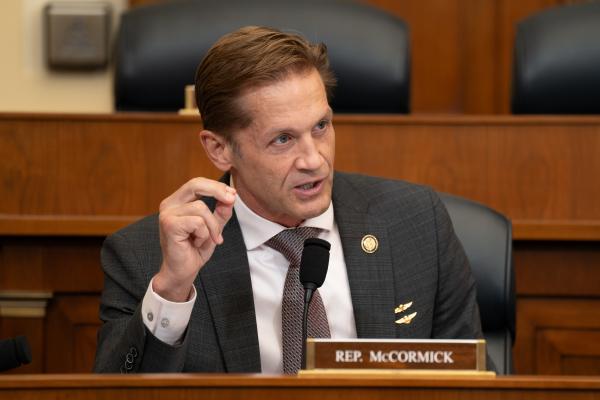
Senior Fellow Jason Hsu will host Congressman Rich McCormick (R-GA), a member of the House Armed Services Committee and Foreign Affairs Committee and a former member of the bipartisan Task Force on Artificial Intelligence, for a conversation on securing American AI leadership.
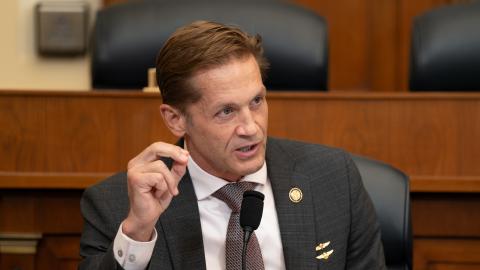

At Hudson, Senior Fellows Brendan Brown and Harold Furchtgott-Roth and Mises Institute Senior Fellow Alex Pollock will discuss the book’s findings and how gold-based monetary reform combined with the increased use of modern analytical tools can help end the inflationary spiral.
